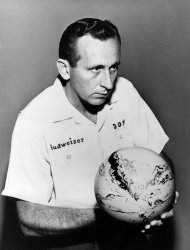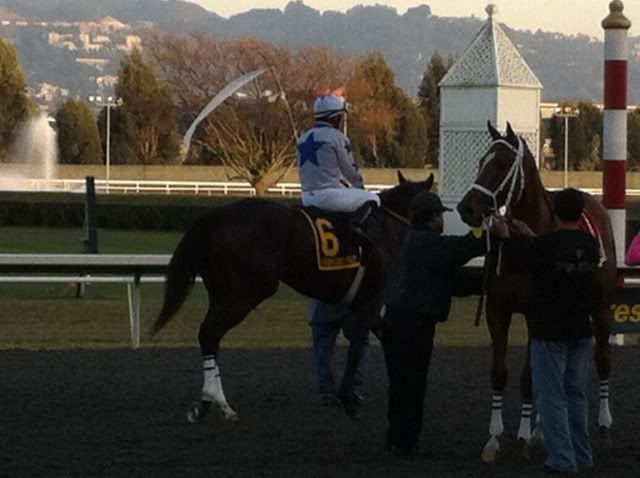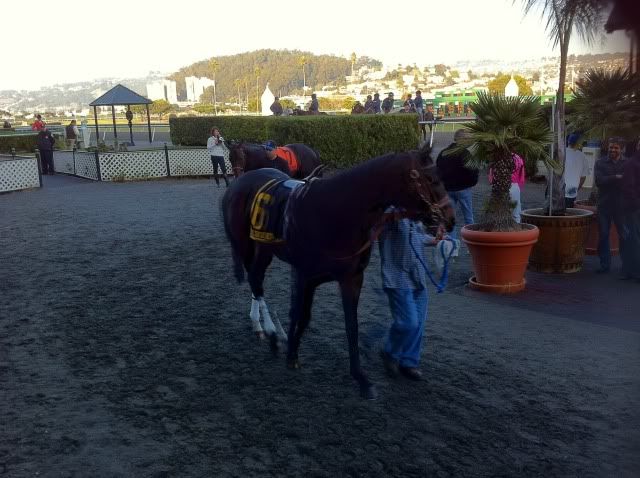Bowling great Don Carter dies at 85
Associated Press
By STEVEN WINE | AP – 5 hrs ago
FILE - In this April 20, 1959, file photo, Don Carter poses with his bowling bowl …
FILE - In this Dec. 9, 1959 file photo, bowler Don Carter is shown during a tournament …
MIAMI (AP) — Don Carter, the bowling great with the unorthodox style who flourished as a genuine sports celebrity during the game's golden age on TV, has died. He was 85.
Carter died at his home in Miami on Thursday night, the Professional Bowlers Association said Friday. He recently was hospitalized with pneumonia complicated by emphysema.
Carter, known as "Mr. Bowling," was the game's original superstar. He became his sport's most recognizable name at a time when alleys were thriving across the country and bowling was starting to assert itself as a fixture on television. Carter was a leading force in the formation of the PBA in 1958 and became a charter member of the PBA Hall of Fame in 1975.
He had a style all his own as he took his steps to the line. With his stooped shoulders and cocked elbow, he made a deep knee bend as he unleashed the ball as if pushing it toward the pins.
Carter helped transform a sport that had been a blue-collar recreational activity. He ruled the lanes with the likes of Dick Weber, Ray Bluth, Pat Patterson, Carmen Salvino and Billy Welu. But Carter was clearly at another level. His name might not cast quite the light as such sports luminaries then as Mickey Mantle, Johnny Unitas or Arnold Palmer, but it was close.
"Don was the greatest bowler of his era," Bluth said. "There was no one like him."
He also did something that no one in baseball, football or golf ever did. He became the first athlete in American sports history to sign a $1 million marketing endorsement contract, with bowling ball manufacturer Ebonite in 1964.
"It is impossible to put into words what Don Carter meant to the PBA and the sport of bowling," PBA Commissioner Tom Clark said. "He was a pioneer, a champion and will never be forgotten."
The 6-foot, 200-pound Carter bowled five 800 series, 13 perfect games and six 299s in sanctioned play. He practically held a monopoly on bowling honors. He was voted Bowler of the Year six times (1953, 1954, 1957, 1958, 1960, 1962).
He served as the PBA's first president. He was inducted into the American Bowling Congress Hall of Fame in 1970. Carter was selected as the greats bowler in history in a 1970 Bowling Magazine poll. He ranked second to Earl Anthony in the magazine's poll in 2000 of the 20 greatest bowlers of the 20th century.
"Don was one of the greatest bowlers who ever lived, but he had some other things that made him great," Salvino said. "He was a great athlete. He won two 100-game tournaments in one year and I don't know how many other bowlers could take that kind of punishment. And he had the ability to focus better than anyone I've ever seen.
"On the lanes, he was in his own world, but off the lanes, he was a true gentleman," Salvino added. "I had a lot of respect for him, as a bowler and as a man."
Carter was born in St. Louis and was introduced to bowling when his mother treated him to a game of bowling on his 13th birthday.
"That was the biggest birthday present of my life," Carter once wrote in an article. "I enjoyed that one game so much that when one of my teachers started a bowling club after school, I signed up. Then I started setting pins so I could bowl and practice for free."
He played for the famous Budweisers of St. Louis, but his profile grew on television shows like Jackpot Bowling, Make That Spare and Championship Bowling that were watched by millions.
Carter wanted to create a bowling tour that was similar to the one in golf. The PBA was launched in 1959 with three tournaments. Three years later, it had a schedule of 32 events. Carter eventually won seven PBA titles including five major championships. Because of ailing knees, Carter retired from PBA play in 1972.
Carter also excelled at baseball, playing American Legion baseball with Yogi Berra and Joe Garagiola. After serving with the Navy during World War II in the South Pacific, he signed a minor league contract with the Philadelphia Athletics as a pitcher-infielder. But after a year, he returned to St. Louis and to bowling.
Carter married LaVerne Haverly in 1953. They divorced, and he married Paula Sperber in the 1970s. Both women are in the Women's International Bowling Congress Hall of Fame.
After retiring from bowling, Carter moved to Miami. He occasionally competed in pro-am tournaments in the 1990s, and he owned a chain of alleys and a line of bowling apparel. His hobbies included golf and painting, and he was involved in charity work for abused children.
Carter rarely ventured far from home in retirement, not caring for public speaking or air travel. But in the 1980s he appeared in Miller Lite commercials featuring retired sports stars.
"I really don't think anybody under the age of 65 remembers me," Carter said about those ads. "I'm really big with senior citizens. I'm famous because I'm the only guy to have two wives in the Hall of Fame."
In addition to his wife, Paula, Carter is survived by sons Jim and John, daughter Caycee, three grandchildren and five great grandchildren.
Details on memorial services are pending.




